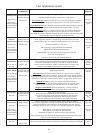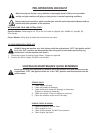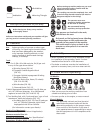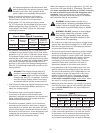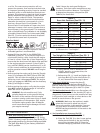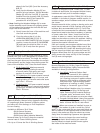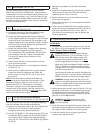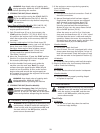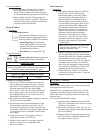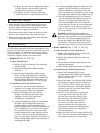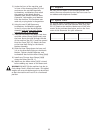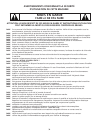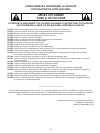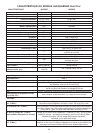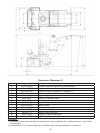
30
2) Gasoline Model:
a) Check engine air cleaner daily! If cutting
dry check engine air cleaner every four
hours! Clean or replace air cleaner element
as recommended by the engine manufacturer.
b) Check engine oil daily. Change engine oil
after every 50 hours of operation. Engine Oil
capacity is See engine operation manual for
proper care and maintenance.
Every 50 Hours:
1) All Models:
a)
Lubrication Points:
Lubricate every 50 hours using only a
Premium Lithium 12 based grease con-
forming to NLG1 GRADE #2 consistency.
1. Spindle Bearings: Six places total,
three Bearings [RR 1] on top of the
gearbox [FIG. 29] and three below
the gearbox (Not Shown).
2.
Rear Wheels: Two places [FIG. 30].
2) Gasoline Model:
Change Engine Oil: Change engine oil
after every 50 hours of operation.
Engine Oil Type
Under normal operating conditions use SAE 10W30 API
service classification SF or SG. See engine operation
manual for other recommended oil types.
Engine Oil Capacity (Honda GXV340)
1.16 U.S. Quarts 1.1 Liters
a) Engine Oil Change Procedure:
1. Drain the oil while the engine is still warm to
assure rapid and complete oil drain. Pivot the
Rear Axle To The Operation Position [F]. Place
a bucket under the Oil Drain Hose [WW],
[FIG. 12, FIG. 13] to catch the used oil. Remove
the oil drain plug on the end of the Oil Drain
Hose [WW] and wait for all of the used oil to
be drained for the engine.
2. Re-install and securely tighten the plug in the end
of the Oil Drain Hose [WW].
3. Re-fill engine with the recommended oil type.
See the engine operation manual for the oil
fill location and proper oil level. Note that the
required oil capacity will be slightly larger because
of the volume of oil contained in the Oil Drain
Hose [WW].
4. Check the oil level. If the proper oil level is
indicated, re-install the oil fill cap.
5. Dispose of the used oil in a proper container
and in a manner that is compatible with
the environment.
When Required:
1) All Models:
a) Lubrication:
Gearbox Grease Port [RR 3]
[See FIG. 29]: Used to lubricate the
transmission gears, if required. These
gears are factory lubricated with 24
ounces (.68 kg) of Lubriplate (Brand)
630-2 or equal, and should not require
any lubrication until service work to the
gears is required (at 500 - 1000 hours).
Lubricate as required with Lubriplate
(Brand) 630-2 or equal. To inspect the
inside of the gearbox, remove the two
Capscrews that attach the Gearbox
Grease Port Cover [RR 3] and remove
the cover. A 1.00” (25 mm) hole in the
gearbox allows visual inspection of the
condition and quantity of the grease
and the gears.
b) Replace Accessory Disk Isolators: Each of
the Accessory Disks [P] have six (6) rubber
isolators (See Parts List - Gearbox Assembly)
that constantly flex and move as the
machine operates. Over time the isolators
can deteriorate and wear out. Check to
see if they are damaged or deteriorated,
if so, replace immediately. All twelve (12)
isolators should be replaced as a set.
c) V-Belt Inspection: Check to see that the
V-belts are not frayed or worn. If they are,
replace immediately.
8. V-Belt Tension
All Models:
Check V-Belt tension when unit is new and never set
belt tension beyond this point.
The machine is equipped with high tension V-Belts.
The belts are properly tensioned at the factory, but
after a few hours of operation they will stretch and
become loose.
a) Tensioning Blade Shaft V-Belts:
1) Loosen the four (4)
Motor Base Capscrews
[ZZ] [FIG. 3] that attach the motor or engine
platform to the frame.
2) Loosen the
Jam Nut [YY] [FIG. 32] until it is
not preventing the Belt Tensioning Drawbolt
[UU] from rotating.
3) Tighten the
Belt Tensioning Drawbolt [UU]
[FIG. 32] until the V-belts are tightened to
the original factory tension.
Note: Early models have one removable
Capscrew that exposes a .50” (12 mm)
diameter inspection hole.



